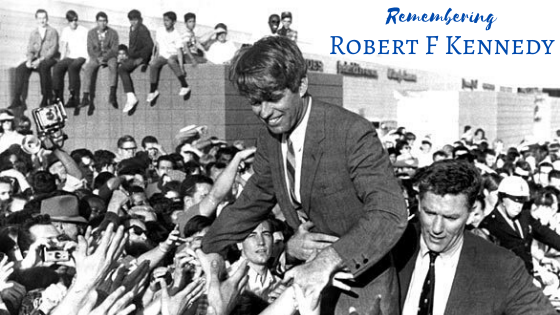The site where Robert Kennedy stood and informed the black community of Indianapolis of Martin Luther King Jr's death is now the Landmark for Peace Memorial. His speech can be heard here. It was touching to see parts of it memorialized at the Landmark for Peace. His words are as relevant today as they were 52 years ago.
"I have bad news for you, for all of our fellow citizens, and people who love peace all over the world, and that is that Martin Luther King was shot and killed tonight.Martin Luther King dedicated his life to love and to justice for his fellow human beings, and he died because of that effort.In this difficult day, in this difficult time for the United States, it is perhaps well to ask what kind of a nation we are and what direction we want to move in. For those of you who are black--considering the evidence there evidently is that there were white people who were responsible--you can be filled with bitterness, with hatred, and a desire for revenge. We can move in that direction as a country, in great polarization--black people amongst black, white people amongst white, filled with hatred toward one another.Or we can make an effort, as Martin Luther King did, to understand and to comprehend, and to replace that violence, that stain of bloodshed that has spread across our land, with an effort to understand with compassion and love.For those of you who are black and are tempted to be filled with hatred and distrust at the injustice of such an act, against all white people, I can only say that I feel in my own heart the same kind of feeling. I had a member of my family killed, but he was killed by a white man. But we have to make an effort in the United States, we have to make an effort to understand, to go beyond these rather difficult times.My favorite poet was Aeschylus. He wrote: "In our sleep, pain which cannot forget falls drop by drop upon the heart until, in our own despair, against our will, comes wisdom through the awful grace of God."What we need in the United States is not division; what we need in the United States is not hatred; what we need in the United States is not violence or lawlessness; but love and wisdom, and compassion toward one another, and a feeling of justice toward those who still suffer within our country, whether they be white or they be black.So I shall ask you tonight to return home, to say a prayer for the family of Martin Luther King, that's true, but more importantly to say a prayer for our own country, which all of us love--a prayer for understanding and that compassion of which I spoke.We can do well in this country. We will have difficult times; we've had difficult times in the past; we will have difficult times in the future. It is not the end of violence; it is not the end of lawlessness; it is not the end of disorder.But the vast majority of white people and the vast majority of black people in this country want to live together, want to improve the quality of our life, and want justice for all human beings who abide in our land.Let us dedicate ourselves to what the Greeks wrote so many years ago: to tame the savageness of man and make gentle the life of this world.Let us dedicate ourselves to that, and say a prayer for our country and for our people."
(Text of Robert Kennedy's speech copied from the JFK library here.)
In the wake of Martin Luther King Jr's death, riots broke out across the country. Indianapolis is one of the few major cities that did not experience widespread violence in reaction to the beloved leader's assassination, and Robert Kennedy is often credited for that. He revealed his own heart, his own pain about losing his brother to a murderer's bullet, and it made him vulnerable and empathetic to people who had lost someone who felt like a loved one, even if they had never met him. Robert Kennedy was one of the few people who was able to bridge the gap between people who were hurting and those with the power to make changes.
Just two months later, Robert Kennedy, another man who "dedicated his life to love and to justice for his fellow human beings," was shot and killed after giving a speech celebrating his victory in the California primaries.
Before visiting this park, I had no idea that this beautiful monument existed. I was expecting a plaque that most people passed without realizing what it was. Imagine my excitement when I saw this breathtaking sculpture of two men remembered for striving for peace and unity. They reach toward each other, reach for peace, reach for a better future. Let's not disappoint them.
~~~~~~~~~~~~~~~~~~~~~~~~
Photos are property of Samantha Wilcoxson
Read more about Robert Kennedy in my Remembering RFK blog series.





No comments:
Post a Comment